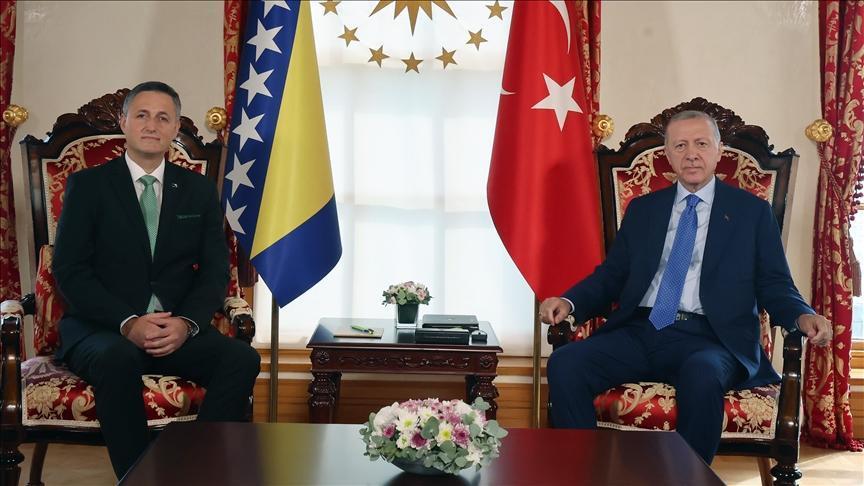
President Recep Tayyip Erdoğan has drawn parallels between Israel's ongoing violence in Gaza and the 1995 genocide of Bosnian Muslims.
"We are experiencing a similar massacre in Gaza and the occupied Palestinian territories to the one that was carried out before the eyes of the world in Bosnia and Herzegovina in the 1990s," Erdoğan said at a joint press conference with Bosnian Presidential Council head Denis Becirovic on Sept. 14.
The massacre saw more than 8,000 Bosnian Muslims killed by Bosnian Serb forces in the town of Srebrenica in July 1995.
"Just as the perpetrators of the Srebrenica genocide were convicted in international courts, the perpetrators of what happens in Gaza will also be held accountable before international law," Erdoğan said.
Referencing the late Bosnian leader Alija Izetbegovic, Erdoğan cited his words that "Forgotten genocides are repeated."
Türkiye will continue efforts to "explain the genocide to future generations," he added.
Ankara has officially declared July 11 as the "International Day of Reflection and Remembrance of the Srebrenica Genocide," according to a presidential decree issued earlier this year.
It has also previously filed a request with the International Court of Justice (ICJ) to join South Africa’s genocide lawsuit against Israel.
The meeting between Erdoğan and Becirovic addressed bilateral relations and regional developments, particularly in the Balkans.
“In the light of past experiences, we should not forget the fact that any negative development in Bosnia and Herzegovina will pose a threat to the stability of the entire Balkans,” Erdoğan said.
“This understanding, as well as our historical and cultural ties, lies at the heart of our approach to our friend Bosnia and Herzegovina."
The steps to be taken at the U.N. against the Israeli violence in Gaza were also discussed, along with military and security cooperation. They also agreed to boost bilateral trade, aiming to reach $1 billion in trade volume by the end of the year.
The Srebrenica killings were the bloody crescendo of the 1992-95 war in Bosnia, which came after the break-up of Yugoslavia unleashed nationalistic passions and territorial ambitions that set Bosnian Serbs against the country’s two other main ethnic factions — Croats and Bosniaks.
The massacre has been declared a genocide by international and national courts, but Serb leaders in Bosnia and neighboring Serbia continue to downplay or even deny it despite the irrefutable evidence of what happened.
The Bosnian Serb wartime political leader, Radovan Karadzic, and his military commander, Ratko Mladic, were both convicted of genocide in Srebrenica by a special U.N. war crimes tribunal in The Hague.
In all, the tribunal and courts in the Balkans have sentenced close to 50 Bosnian Serb wartime officials to more than 700 years in prison for the Srebrenica killings.